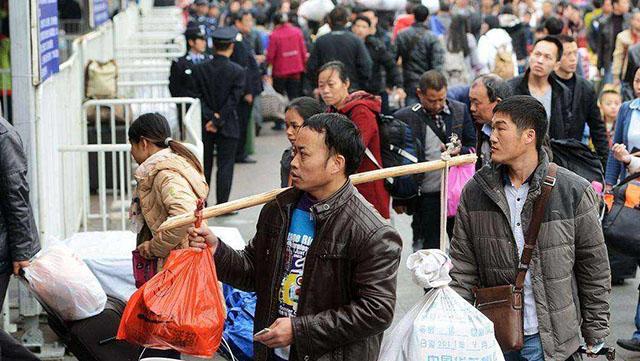
In the past, the mainland had more than 40 days of spring transportation every year, and before the Spring Festival, a large number of migrant workers would "return to their hometowns", and after the Spring Festival, a large number of migrant workers would "return to work". In recent years, there has been no large-scale "homecoming tide" in China, and after the Spring Festival, the "return to work tide" of migrant workers has also disappeared. Now as long as you go to the railway stations or long-distance bus stations in major cities, you will find that after the Spring Festival this year, the "return to work tide" of migrant workers is disappearing, and migrant workers have no longer returned to the city.
So, what caused the disappearance of the "return to work tide" of migrant workers after the Spring Festival? We believe that the main reasons are as follows:
First, before the Spring Festival this year, epidemics occurred in many places from time to time, and many cities in China encouraged migrant workers to stay in the places of work and go back after the epidemic was over, and even some employers also sent red envelopes to migrant workers, so that migrant workers could get together to eat Chinese New Year's Eve meals. There are fewer migrant workers returning to their hometowns for the Spring Festival this year, and there will naturally be many fewer migrant workers who "return to work" after the holiday.
Second, some migrant workers do not plan to go to the city to work, mainly for two reasons: First, it is becoming more and more difficult to find a job in the city. The old group of migrant workers are already 40 or 50 years old, and they still have to risk their lives to work on the construction site, and sometimes the contractors have to pay wages for a long time.
And think of manufacturing work, now many enterprises can not receive orders, has already started insufficient, usually do a break one, or do two rest one, before the Spring Festival on the early holiday, now even if you are in a hurry to return to work, there is nothing to do, can not make any money, it is better to continue to rest at home.
Second, although the income of working in big cities is quite high, there are also thousands of yuan, and some migrant workers earn more than the locals, but the cost of living in the city is also very high, renting a house will use up one-third of the wages, and the daily expenses will also have a larger expense, and it is also inevitable to have a party between colleagues and fellow villagers.
In this way, if the round-trip travel expenses are deducted, the migrant workers will be busy working for a year and will not be able to send back home much money. It is better to find a job near your hometown, so that the daily expenses are reduced, the rent money is saved, and you can save money.
Third, the economic development of the rural areas is getting better and better, and the gap between the countryside and the cities is gradually narrowing. This also provides migrant workers with opportunities for employment and entrepreneurship in their hometowns. Now many migrant workers have used the skills they have learned to find a stable job in the enterprises in their hometowns.
Some migrant workers have used their own agricultural technology to carry out modern breeding and planting, and have produced some high value-added agricultural products. There are also some migrant workers who have set up express stations, opened small supermarkets, or started farms in their hometowns, and their income has increased significantly after starting a business, and they are not willing to go to the city to work again.
In recent years, after the Spring Festival, the "wave of returning to work" has gradually disappeared, many farmers are reluctant to go to the city to work because of their age, it is difficult to find a job after entering the city, and some migrant workers feel that the cost of living in the big city is too high, and they can't save much money, it is better to work near their hometown, so they can also be with their families. More crucially, now that the rural economy has also developed rapidly, migrant workers do not necessarily have to go to the city to work, but can seek another development in their hometown and contribute to the economic construction of their hometown.